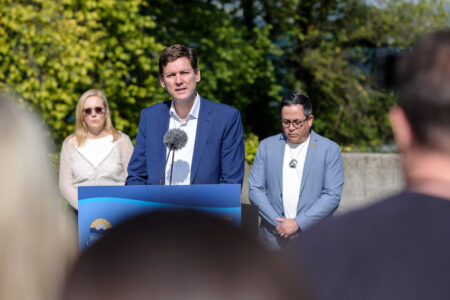Mixed reaction on provincial budget from local experts
The 2014 budget brought down in the legislature by the provincial government on Tuesday this week is meeting with mixed reactions from experts in the Nelson area.
Presented by Finance Minister Mike de Jong, who called it his “’boring, balanced’ budget according to The Province newspaper, this year’s budget is not only balanced, but offers up a $175 million surplus – making it one of only two balanced budgets in the country this year.
The budget also lays out the province’s roadmap for its liquefied natural gas (LNG) agenda, which is expected to eventually get rid of the government’s growing $56 billion debt and make the province more prosperous.
And while the BC Liberals included $350 million in their budget for families that comes in the form of a payment of $55 per child under age six, the previously announced $1,200 BC Education Saving Grant and more money for daycares – it also raised MSP premiums for the sixth year in a row, making the average family pay $144 per month.
On top of that the province continued to cut funding to advanced education, and froze spending on K to 12 education.
Mungall says budget offers little for locals
Nelson-Creston MLA, Michelle Mungall says the recent budget announced by the BC Liberals takes money from people’s pockets but gives them little, if anything, in return.
“I would characterize this budget as one that’s costing families more but giving them less,” Mungall says. “Families are going to be paying an extra $215 per year for MSP, while here in the Kootenays we’re getting less services.
“We’re fighting to keep the Kaslo ER and we’ve been fighting for 10 years to keep services at Kootenay Lake Hospital . . . We know we’re getting less services, but they’re asking us to pay more.”
Mungall adds that there is nothing to speak of in the budget for addressing the province’s labour shortage and skills gap, including no mention of funding for Selkirk College.
“We have a Selkirk College campus (in Nelson), the Silverking Campus, where we train people and it’s vastly outdated,” she says. “Selkirk College has a plan to up date it and they need the government to get on board. “I don’t see any plan to do that, when they’re cutting post-secondary education.”
“I don’t see anything (in the budget) for the economic drivers that matter to us, like post-secondary education, tourism and forestry.”
She added that the province’s budget could be broken on the back of its recent loss in a supreme court case with the BC Teachers Federation that would see class sizes and staffing levels return to 2002 levels – at a total estimated cost to the province of $1 billion.
“They have an appeal in the courts right now, and if they lose that appeal, they haven’t budgeted a contingency for that,” Mungall notes.
Fiscal prudence is key
Nelson and District Chamber of Commerce Executive Director, Tom Thomson says the province’s decision to hold tight on the purse strings and make cautious estimates on economic growth is a good decision.
“As we look to drive our medium and long-term economic prosperity, it’s important that we remain committed to fiscal prudence by only spending what you have,” Thomson says.
“You can see there is still a level of a caution, which likely demonstrates continued fiscal challenges.”
When asked if cuts to funding at Selkirk College would be a detriment to the local economy, Thomson says the lack of emphasis on skills development in the budget was definitely a down side.
“Given the emphasis the chamber has placed on skills and training, we are a little disappointed to see no new programs or initiatives aimed at skills development,” he says, noting that the recent budget does include some “targeted resources to increase capacity” in the form of funding for the trades training facilities in Kamloops, the Okanagan and Victoria.
“Trades training is certainly beneficial to the long-term economic prospects, so we will continue our advocacy efforts to provide (capital) assistance to increase capacity at our regional college.”

























